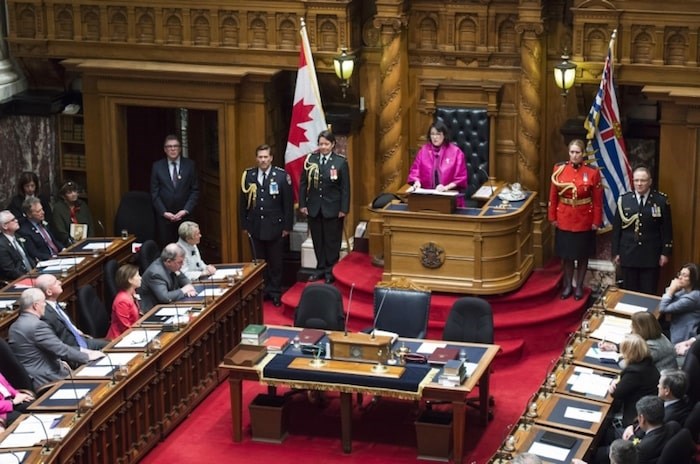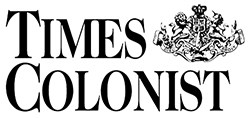Centred around the theme of making life more affordable, the NDP government’s throne speech promised to unveil a poverty reduction strategy, enshrine universal daycare into law, continue a freeze on ferry fares and prevent British Columbians from being gouged by ticket scalpers, predatory payday lenders and high cellphone bills.
While there was no mention of its campaign promise for $10-a-day child care, the government promised that universal day care will build on the child care subsidies introduced in last year’s budget, measures which lowered daycare fees for families across the province.
 B.C. Lieut.-Gov. Janet Austin delivers the speech from the throne at the legislature. Feb. 12, 2019. Photo by Jonathan Hayward/The Canadian Press
B.C. Lieut.-Gov. Janet Austin delivers the speech from the throne at the legislature. Feb. 12, 2019. Photo by Jonathan Hayward/The Canadian Press
“This year, government will set the foundation for the full implementation of B.C.’s affordable child care program,” according to speech, delivered by Lt.-Gov Janet Austin Tuesday afternoon at the B.C. legislature. “A key element of this effort will be a collaborative process to develop new legislation to give universal access to quality, affordable childcare the force of law.”
In November, thousands of parents were told they’ll be paying $10-a-day for daycare until March 2020 if their children were enrolled at 53 prototype daycares. More details on affordable child care could be released in next Tuesday’s budget.
Building around the theme of “making life better for people,” the throne speech highlighted several initiatives already implemented by the B.C. government, including elimination of medical services plan premiums as of Jan. 1, 2020, investments in affordable housing and reforms to protect renters, and maintaining a freeze on ferry fares for major routes and discounts on minor routes.
The speech acknowledged that public trust has been shaken because of the spending scandal that has rocked the B.C. legislature. The legislature’s two most senior officials, clerk Craig James and sergeant-at-arms Gary Lenz have insisted they are innocent in the face of the Speaker’s allegations of overspending and questionable expenses. The two are suspended with pay while an investigation is conducted by police.
“The strength of this legislature does not come from stone, slate marble or granite. It comes from a foundation of public trust. That trust was recently shaken. This government values transparency and takes very seriously its responsibility to maintain the integrity of our public institutions,” the throne speech said.
The government promised to work with the legislative assembly to implement reforms that restore trust in the legislature.
In an attempt to address the housing crisis, the government pointed to the 17,000 homes being built with government grants, including on-campus homes for students, Indigenous housing on and off reserves, housing for women and children fleeing domestic violence, and affordable rentals for families.
The speech addressed the tent cities that have popped up around the province, including Nanaimo, saying hundreds of people previously living in tents are now living in modular homes.
The government insisted its efforts to cool the housing market, through the speculation tax and the foreign buyers tax, are working, pointing to a moderated real estate market in Metro Vancouver.
Help was also promised to renters, as the government looks to implement some of the recommendations outlined in the Rental Housing Task Force, which proposed an end to renovictions.
The government will deliver its first-ever poverty reduction strategy, which it said will help the more than half a million British Columbians who live below the poverty line.
Cellphone providers got special mention in the throne speech, as the government promised to look into ways to make cellphone bills more transparent. “Your government will give consumers the tools they need to get the least expensive possible service and encourage the federal government to deliver more affordable cellphone options for people.”
The government promised to crack down on predatory payday lenders and ban the scalper bots that inflate ticket prices for concerts and sporting events.
The throne speech addressed the money-losing public car-insurance corporation, saying changes that take effect April 1 could turn the tide for Insurance Corp. of B.C. and stem further rate increases.
“Your government has undertaken the most significant reforms to car insurance in a generation,” the speech said. “These are new laws, new systems and a new independent tribunal to resolve insurance disputes.”
B.C. residents have a right to be outraged by the possibility that the province’s high house prices are fuelled by criminal activity and money laundering, the government said, and promised to close loopholes and find ways to prevent criminals from gaming the system.
To improve health care, the government has focused on opening new urgent primary care centres, which it also hopes will improve hospital wait times by adding 200 more family-practice physicians, 200 nurse practitioners and 50 clinical pharmacists across the province.
The throne speech touted the government’s CleanBC climate actions, which encourages drivers to opt for clean-energy vehicles and encourages the oil and gas industry to move toward renewable energy.
More funding is on the way for the Royal B.C. Museum, with promises to modernize the Belleville Street building, protect the museum’s holdings and provide better access to those holdings. The government will also establish a new Chinese Canadian Museum.
The speech pledged to continue reconciliation efforts with Indigenous peoples and this year, B.C. will be the first province in Canada to implement the United Nations Declaration of the Rights of Indigenous Peoples.
Approximately 69 Indigenous communities are among the 190 rural and remote communities that will soon have high-speed Internet to run their businesses and connect to public services, the government said.
“Government is making different choices to make life better, so that B.C.’s bright future and unlimited potential is shared with everyone, not just the few.”



